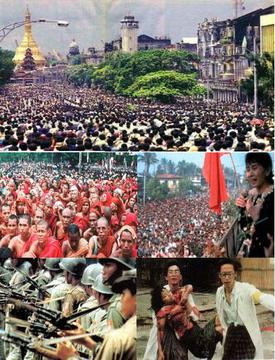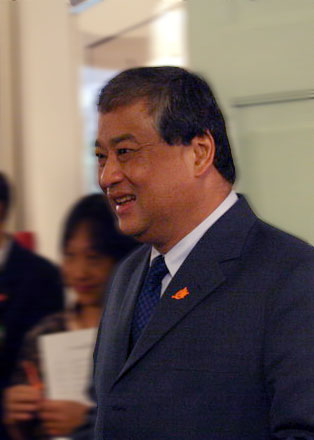
The Iranian Embassy siege took place from 30 April to 5 May 1980, after a group of six armed men stormed the Iranian embassy on Prince's Gate in South Kensington, London.
Johnny Htoo and Luther Htoo are twin brothers who jointly led the God's Army guerrilla group, a splinter group of the Karen National Union, in Myanmar (Burma) during the late 1990s.

Khun Sa was an ethnic Han drug lord and warlord. He was born in Hpa Hpeung village, in the Loi Maw ward of Mongyai, Northern Shan State, Burma. Before he assumed the Shan name "Khun Sa" in 1976, he was known primarily by his Chinese name, Zhang Qifu.
God's Army was a Christian armed revolutionary group that opposed the then-ruling military junta of Myanmar (Burma). The group was an offshoot of the Karen National Union. They were based along the Thailand-Burma border, and conducted a string of audacious guerrilla actions including allegedly being involved in the seizure of the Myanmar embassy in Bangkok in 1999. They have been described as a terrorist organisation.

The Vigorous Burmese Student Warriors were an armed opposition group in Myanmar (Burma). It was formed by students after the 8888 uprising, in opposition to the ruling military junta at the time.

The Karen National Liberation Army is the military branch of the Karen National Union (KNU), which campaigns for the self-determination of the Karen people of Myanmar. The KNLA has been fighting the Burmese government since 1960s as part of the Karen conflict, which has been ongoing since 1949.

The 8888 Uprising, also known as the People Power Uprising and the 1988 Uprising, was a series of nationwide protests, marches, and riots in Burma that peaked in August 1988. Key events occurred on 8 August 1988 and therefore it is commonly known as the "8888 Uprising". The protests began as a student movement and were organised largely by university students at the Rangoon Arts and Sciences University and the Rangoon Institute of Technology.

Mom Rajawongse Sukhumbhand Paribatra is a Thai politician belonging to the Democrat Party. From 2009 to 2016 he was the Governor of Bangkok. He was removed from the post in October 2016 by Prime Minister Prayut Chan-o-cha who used Section 44 of the interim charter to remove the elected official. The reason given for his ouster was "...because he was involved in many legal cases." He was replaced by Police General Aswin Kwanmuang.
In Myanmar, terrorism is defined by the country's counter-terrorism law and its subsections, which is interpreted by the Anti-Terrorism Central Committee and enforced by the government of Myanmar. Two groups are currently listed as terrorist organisations in accordance with Myanmar's counter-terrorism law; the Arakan Rohingya Salvation Army (ARSA), which was added on 25 August 2017, and the Arakan Army, which was added on 18 January 2019. The SPDC military government called the Vigorous Burmese Student Warriors (VBSW) "terrorists" after their role in the 1999 Myanmar Embassy siege, but the group was never legally declared as such.

Myanmar has been embroiled in armed conflict since 1948, when the country, then known as Burma, gained independence from the United Kingdom. The conflict has largely been ethnic-based, with ethnic armed organisations fighting Myanmar's armed forces, the Tatmadaw, for self-determination. Despite numerous ceasefires and the creation of autonomous self-administered zones in 2008, armed groups continue to call for independence, increased autonomy, or the federalisation of Myanmar. It is the world's longest ongoing civil war, spanning almost eight decades.

The All Burma Students' Democratic Front is an opposition group in Myanmar. It was founded on 1 November 1988, after the 8888 protests in Yangon. The group's leadership consists mostly of former student exiles.

Zoya Phan is a Burmese political activist. She resides in the United Kingdom, and is the Campaign Manager of the human rights organization Burma Campaign UK. She was an outspoken critic of the Burmese government when it was under direct military rule, repeatedly calling for democratic reform in Burma, as well as economic sanctions from both the British government and the United Nations. Following political changes in the country from 2011, she has continued to campaign for international action to end ongoing human rights violations, especially regarding the use of rape and sexual violence against ethnic women by the Burmese Army.
The 2010–2012 Myanmar border clashes were a series of skirmishes between the Tatmadaw on one side, and the DKBA-5 and the Karen National Liberation Army (KNLA) on the other. The clashes erupted along the border with Thailand shortly after Myanmar's general election on 7 November 2010. An estimated 10,000 refugees have fled into nearby neighbouring Thailand to escape the violent conflict. There was concern that due to discontent with the elections, and speculations of electoral fraud, that the conflict could escalate into a civil war.

Myanmar–Thailand relations refers to the current and historical relations between Myanmar and Thailand. Myanmar has an embassy in Bangkok, while Thailand has an embassy in Yangon. In recent decades, relations between Burma and Thailand focus mainly on economic issues and trade. Burmese-Thai relations have been shaped by a long and complex history, marked by periods of cooperation, conflict, and political maneuvering. Both nations have shared cultural, religious, and geopolitical interests, yet their interactions have often been characterized by rivalry and territorial disputes. There is sporadic conflict between Myanmar and Thailand over three disputed islands.

The Israeli Bangkok embassy hostage crisis occurred on 28 December 1972. It was a raid by a squad of four Palestinian militants, belonging to the Black September organization, on the Israeli embassy building in Bangkok in which the militants held six Israeli embassy staff hostage. After 19 hours of negotiations, the hijackers agreed to abandon the embassy in exchange for being flown to Egypt. The raid was one of a number of attacks that have been conducted against Israeli embassies and diplomats.

Mae La, alternatively spelled Maela, or Beh klaw, is a refugee camp in Thailand. It was established in 1984 in Tha Song Yang District, Tak Province in the Dawna Range area and houses 50,000 Karen refugees; the number continues to rise as of June 2019. Mae La is the largest refugee camp for Karen refugees in Thailand. Over 90% are the persecuted ethnic Karen. The camps are overseen and run by the Thailand Burma Border Consortium (TBBC), a union of 11 international non-governmental organizations that provide food, shelter and non food items to the Burmese refugees and displaced people.
Arintaraj 26 is the police tactical unit of the Royal Thai Police (RTP).

The 2012 Bangkok bombings were a series of explosions that occurred in Bangkok, Thailand on 14 February 2012, injuring five people. Thai authorities said that the bombings were a botched attempt by Iranian nationals to assassinate Israeli diplomats. Several Iranians were arrested and charged for the attacks, one of whom was badly injured.

The Karen conflict is an armed conflict in Kayin State, Myanmar. It is part of the wider internal conflict in Myanmar between the military government and various minority groups. Karen nationalists have been fighting for an independent state, known as Kawthoolei, since 1949. The Karen National Union (KNU) and its Karen National Liberation Army (KNLA) are the most prominent Karen rebel groups. Hundreds of thousands of civilians have been displaced by the conflict, many of whom fled to neighbouring Thailand and survive in refugee camps.

Lay Kay Kaw Myothit is a town in Myawaddy Township, Kayin State in southeastern Myanmar. Nine miles in the south of Myawaddy, it is close to the border with Thailand.














